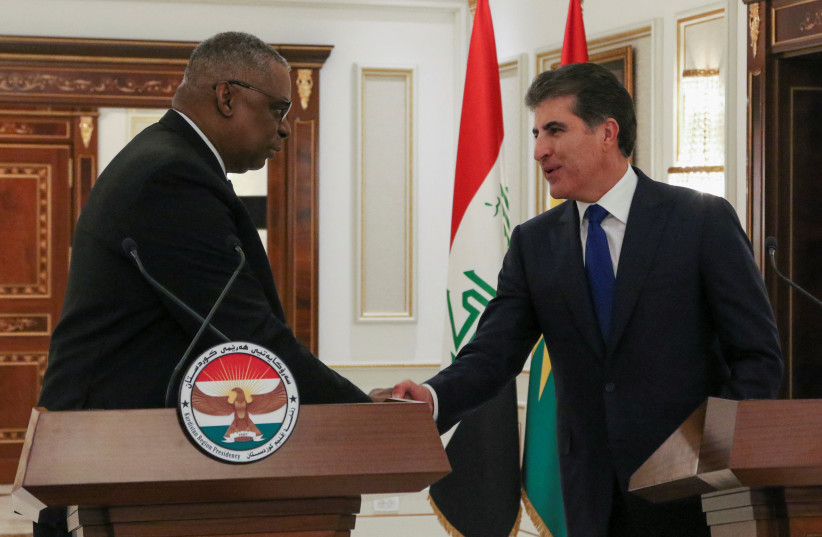US Secretary of Defense Lloyd Austin made an unannounced visit to Iraq on Tuesday, along his Middle East trip, to “reaffirm the US-Iraq strategic partnership as we move toward a more secure, stable and sovereign Iraq,” according to a statement.
Reports noted that it fell on the 20th anniversary of the US’ 2003 invasion of the country. Much has changed in Iraq since. The country is currently struggling economically as Iran seeks to use it as a springboard to move weapons and militias to Syria. Meanwhile, other countries, such as in the Gulf, as well as Jordan and Egypt, see Iraq as a key player in the region.
Austin made familiar notes on this trip.
“Looking forward, US forces are ready to remain in Iraq at the invitation of the Government of Iraq,” he said. “These forces are operating in a noncombat, advise assist and enable role to support the Iraqi-led fight against terrorism. This is a critical mission. And we’re proud to support our Iraqi partners.”
“Now looking forward, US forces are ready to remain in Iraq at the invitation of the Government of Iraq. And these forces are operating in a noncombat, advise assist and enable role to support the Iraqi-led fight against terrorism. This is a critical mission. And we’re proud to support our Iraqi partners.”
Lloyd Austin
There has been controversy about the US role in Iraq.
The US’ role in Iraq has not been without controversies. During the Trump administration, the US sought to withdraw its forces from Syria, using Iraq as a base. However, in 2019, tensions with Iran boiled over with dozens of attacks on facilities where US forces were present in Iraq.

Eventually, this led to the US killing of IRGC Quds Force head Qasem Soleimani and Iraqi Kataib Hezbollah leader Abu Mahdi al-Muhandis in Baghdad in January, 2020. That was a game changer, and the US has since shifted many units to the Iraqi-Kurdistan region; US forces are also not actively involved in raids in Iraq against ISIS.
Essentially, the US is in Iraq – officially – at the invitation of the Iraqis, but it is a critical base for the US for another reason: it also has forces in Syria.
The Kurdistan autonomous region is also very important for the US. Austin said the US will “continue to strengthen and broaden our partnerships in support of Iraqi security, stability and sovereignty.” He also met with Iraqi Prime Minister Mohammed Shia al-Sudani, according to reports. He then continued to Erbil – in the Kurdistan region – where he met with Kurdistan Regional Government (KRG) president Nechirvan Barzani.
Iraqi Defense Minister Najah al-Shammari recently visited Iran, during which Tehran offered training for Iraq’s forces.
Iran holds influence over the Hashd al-Shaabi, a group of militias in Iraq that are now paramilitaries and receive salaries from the Iraqi government. Iran sees Iraq as its “near abroad,” and so it wants the US forces there out.
The visit by Austin is an important reminder – by the US and to the region – that the US continues to play a role in the country. The fact that United States Chairman of the Joint Chiefs of Staff Mark Milley visited Syria last week further emphasizes how important these two countries are to the Biden administration.
Unlike in the Trump era, there is no talk of withdrawal. Yet that doesn’t mean that Iraq may not try to get the US to withdraw anyway. It also doesn’t mean that the US administration has a clear vision for the future in either country.
This is why the visits are important; Austin is showing that the US’ commitment remains strong – Milley’s visit to Syria symbolizes the same.
What remains to be seen now is if the US will follow through with actions. It also remains to be seen if Iran will continue threats to US forces in Iraq and Syria.
